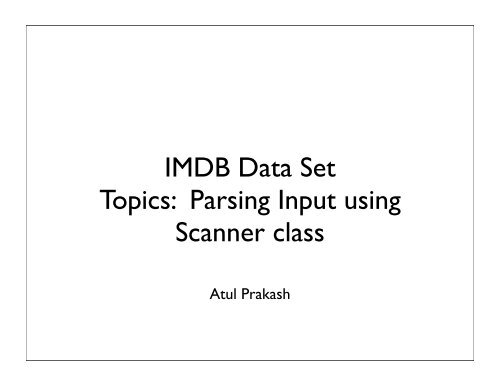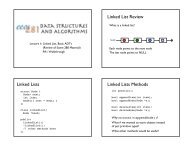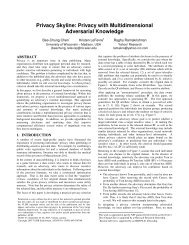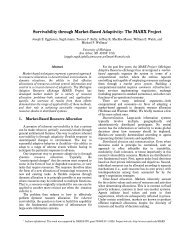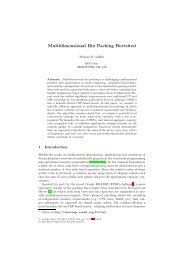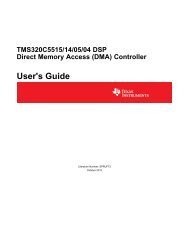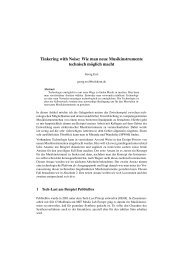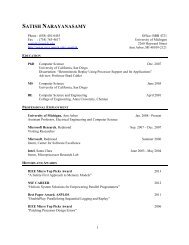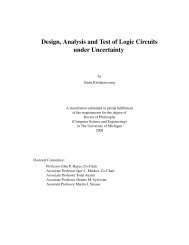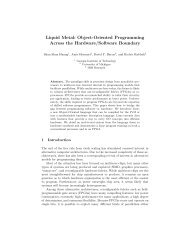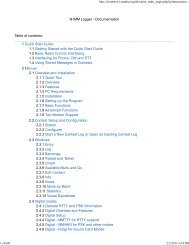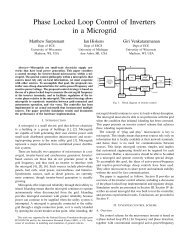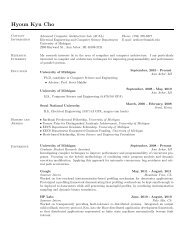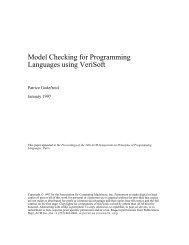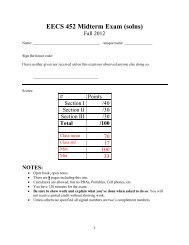IMDB Data Set Topics: Parsing Input using Scanner class
IMDB Data Set Topics: Parsing Input using Scanner class
IMDB Data Set Topics: Parsing Input using Scanner class
You also want an ePaper? Increase the reach of your titles
YUMPU automatically turns print PDFs into web optimized ePapers that Google loves.
<strong>IMDB</strong> <strong>Data</strong> <strong>Set</strong><br />
<strong>Topics</strong>: <strong>Parsing</strong> <strong>Input</strong> <strong>using</strong><br />
<strong>Scanner</strong> <strong>class</strong><br />
Atul Prakash
•<br />
<strong>IMDB</strong> <strong>Data</strong> <strong>Set</strong><br />
Consists of several files:<br />
•<br />
•<br />
movies.list: contains<br />
<br />
actors.list: contains<br />
<br />
• actresses.list:<br />
<br />
•<br />
•<br />
aka-titles.list: <br />
Bunch of other files,<br />
including other crew,<br />
fan ratings, awards,<br />
running times, etc.
Example Queries<br />
• List of movies released in a given year<br />
• Search for movies, given keywords<br />
• Find actors in a given movie (requires<br />
actors.list)<br />
• Find actresses who have acted with a<br />
particular actor, e.g., Woody Allen (requires<br />
actresses.list and actors.list)
Some References<br />
• <strong>IMDB</strong> dataset itself in plain-text downloadable files (download just the<br />
movies.list.gz for now, and uncompress it).<br />
• http://www.imdb.com/interfaces<br />
• An example report of some analysis of the <strong>IMDB</strong> dataset (glance through it):<br />
• http://had.co.nz/data/movies/description.pdf<br />
• A research paper on correlating Netflix dataset with <strong>IMDB</strong> to break<br />
anonymity of reviewers in Netflix (optional read -- shows an example of<br />
privacy risks):<br />
• http://www.cs.utexas.edu/~shmat/shmat_oak08netflix.pdf
Format: <br />
Sample Contents (movies.list)<br />
Titles made unique by including the year of the<br />
release. Also, articles written after comma. E.g.,<br />
"The Godfather" is written as "Godfather, The".<br />
Annotations after the title:<br />
(V): direct video release<br />
(TV): made for TV<br />
(VG): video game<br />
More details on title formatting:<br />
http://www.imdb.com/help/show_leaf?titleformat<br />
'Doctor Who': The Tom Baker Years (1991) (V) 1991<br />
'Doctor Who': The Troughton Years (1991) (V) 1991<br />
'Doctor Who': Then and Now (1987) (TV) 1987<br />
'Doctor Who': Thirty Years in the Tardis (1993) (TV) 1993<br />
'Doctor Zhivago': The Making of a Russian Epic (1995) (TV) 1995<br />
'Dog Day Afternoon': After the Filming (2006) (V) 2006<br />
'Dog Day Afternoon': Casting the Controversy (2006) (V) 2006<br />
'Dog Day Afternoon': Recreating the Facts (2006) (V) 2006<br />
'Dog Day Afternoon': The Story (2006) (V) 2006<br />
'Don't Talk' (1942) 1942<br />
'Donnie Darko': Production Diary (2004) (V) 2004<br />
'Dr. Who': Daleks - The Early Years (1993) (V) 1993<br />
'Duel': A Conversation with Director Steven Spielberg (2004) (V) 2004<br />
'Dune': Models and Miniatures (2006) (V) 2006<br />
'Dune': Special Effects (2006) (V) 2006<br />
'Dune': Wardrobe Design (2006) (V) 2006<br />
'E' (1981) 1981<br />
…<br />
Dune (1973) 1973<br />
Dune (1984) 1984<br />
Dune (2010) 2010<br />
Dune 2000 (1998) (VG) 1998<br />
Dune 7 (2002) 2002<br />
Dune Buddies (1978) 1978<br />
Dune Bug (1969) 1969<br />
Dune II: The Building of a Dynasty (1992) (VG) 1992<br />
Dune Surfer (1988) 1988<br />
Dune Warriors (1990) 1990<br />
Dunechka (2004) 2004<br />
Dunera Boys, The (1985) (TV) 1985<br />
Dunes of Destiny (2005) 2005<br />
Dung che sai duk (1994) 1994
•<br />
Reading in <strong>Data</strong><br />
Several <strong>class</strong>es in Java to<br />
help parse and read<br />
input:<br />
•<br />
•<br />
•<br />
•<br />
String.split methods<br />
<strong>Scanner</strong> <strong>class</strong><br />
StringTokenizer <strong>class</strong><br />
Pattern and Matcher<br />
<strong>class</strong>es<br />
•<br />
Reference with<br />
examples:<br />
• http://www.javapractices.com/<br />
topic/TopicAction.do?Id=87<br />
• Or Google search for:<br />
• Java practices Parse<br />
text input
• Sample input file<br />
• Format: key = value<br />
Example<br />
height = 167cm<br />
mass = 65kg<br />
disposition = "grumpy"<br />
this is the name = this is the value<br />
• Strategy: read line by line. Use "=" as a<br />
seperator to extract key and value. Store<br />
in a list.
<strong>Scanner</strong> Class<br />
• <strong>Scanner</strong> <strong>class</strong> is very powerful for string<br />
parsing and may be all you need in many<br />
cases<br />
• For examples illustrated here, see: http://www.javabeat.net/tips/24-parsing-input-<strong>using</strong>-scanner.html<br />
import java.util.<strong>Scanner</strong>; // import <strong>Scanner</strong> <strong>class</strong> from java.util package<br />
public <strong>class</strong> <strong>Scanner</strong>Demo {<br />
public static void example1() {<br />
}<br />
<strong>Scanner</strong> scanner = new <strong>Scanner</strong>("EECS 282 is a great <strong>class</strong>");<br />
while (scanner.hasNext()){<br />
}<br />
System.out.println(scanner.next());<br />
}<br />
public static void main(String[] args) {<br />
}<br />
example1();<br />
EECS<br />
282<br />
is<br />
a<br />
great<br />
<strong>class</strong>
Field-separated values<br />
public static void stringScanningWithSeparator() {<br />
}<br />
<strong>Scanner</strong> scanner = new <strong>Scanner</strong>("George Washington, President, born 1732");<br />
scanner.useDelimiter(",");<br />
while (scanner.hasNext()) {<br />
System.out.println(scanner.next()); // will print 3 items.<br />
}<br />
George Washington<br />
President<br />
born 1732<br />
Here, comma is used as a separator. Can use any<br />
string as a separator, e.g., "\t" (tab)<br />
Default seperator: whitespace
What does the<br />
following print?<br />
public static void stringScanningWithSeparator() {<br />
}<br />
<strong>Scanner</strong> scanner = new <strong>Scanner</strong>("George Washington, President, born 1732");<br />
// scanner.useDelimiter(",");<br />
while (scanner.hasNext()) {<br />
System.out.println(scanner.next()); // will print 3 items.<br />
}<br />
Are spaces printed?<br />
How are commas treated?
Reading Typed Values<br />
public static void scanInts() {<br />
}<br />
Output:<br />
<strong>Scanner</strong> scanner = new <strong>Scanner</strong>("1 3");<br />
int first = scanner.nextInt();<br />
int second = scanner.nextInt();<br />
System.out.println("first = " + first + "; second = " + second);<br />
first = 1; second = 3<br />
Similar methods: nextBoolean, nextByte,<br />
nextDouble, etc. To read String, just use next()
Checking <strong>Input</strong> Type<br />
Before Reading<br />
• Use hasNextType method, where Type is<br />
the type being read, e.g., hasNextInt,<br />
hasNextBoolean, hasNext, hasNextLine<br />
public static void scanTypes() {<br />
}<br />
<strong>Scanner</strong> scanner = new <strong>Scanner</strong>("1 3 5 7 9 11 abc 13 def 15");<br />
while (scanner.hasNextInt()){<br />
}<br />
System.out.println(scanner.nextInt());<br />
hasNextInt() returns false on<br />
"abc"<br />
1<br />
3<br />
5<br />
7<br />
9<br />
11
Reading Files<br />
• <strong>Scanner</strong> s = new <strong>Scanner</strong>(FileObject)<br />
• Creates a scanner on a file object<br />
• Examples of file objects:<br />
• System.in: standard input, by default,<br />
terminal input<br />
• File in = new File(filepath);
public static void scanLinesFromFile() {<br />
}<br />
Example<br />
File in = new File("/Users/aprakash/Documents/282/workspace/282/input.txt");<br />
<strong>Scanner</strong> scanner = new <strong>Scanner</strong>(in);<br />
int linenum = 1;<br />
while (scanner.hasNextLine()) {<br />
String line = scanner.nextLine();<br />
System.out.println(linenum + ": " + line);<br />
linenum++;<br />
}<br />
scanner.close(); // important to close scanners on files.
File Paths on Windows<br />
// parse a file containing lines with part1,part2<br />
// For windows, you would do something like<br />
File in = new File("C:\\282\\input.txt");<br />
Two backslashes needed because "\" is also used<br />
in other ways, e.g., \n, \t. It must be "escaped" with<br />
another backslash.<br />
// or you can use forward-slashes. Java will convert / to \\:<br />
File in = new File("C:/282/input.txt");<br />
// You can also use relative path names, e.g., "282/input.txt".<br />
// In Eclipse, go to Run->Run Configurations...->Arguments to<br />
// set current directory. Relative paths are with respect to the current<br />
// directory.
Closing files<br />
• scanner.close() is important. It closes the<br />
scanner object, as well as the file bound to<br />
it. Otherwise, file remains open and<br />
consumes an operating system resource.<br />
• Always close files when done reading them.
Exceptions in I/O<br />
• Unfortunately, Eclipse gives an error in the<br />
above code about an uncaught exception:<br />
FileNotFoundException
Reason<br />
File in = new File("/Users/aprakash/Documents/282/workspace/282/input.txt");<br />
<strong>Scanner</strong> scanner = new <strong>Scanner</strong>(in);<br />
What if the file does not exist?<br />
Unlike run-time errors (e.g., divide by 0), Java<br />
requires you to handle I/O exceptions
Declaring the thrown<br />
exception<br />
public static void scanLinesFromFile() throws FileNotFoundException {<br />
}<br />
// parse a file containing lines with part1,part2<br />
// For windows, you would do something like<br />
// File in = new File("C:\\282\\input.txt");<br />
// or you can use forward-slashes on Windows. Java will convert:<br />
// File in = new File("C:/282/input.txt");<br />
// You can also use relative path names, e.g., "282/input.txt".<br />
// In Eclipse, go to Run->Run Configurations...->Arguments to set current directory)<br />
File in = new File("/Users/aprakash/Documents/282/workspace/282/input.txt");<br />
<strong>Scanner</strong> scanner = new <strong>Scanner</strong>(in);<br />
int linenum = 1;<br />
while (scanner.hasNextLine()) {<br />
}<br />
String line = scanner.nextLine();<br />
System.out.println(linenum + ": " + line);<br />
linenum++;<br />
scanner.close(); // important to close scanners on files.
Alternative -- Catch<br />
Exceptions<br />
public static void scanLinesFromFile2() {<br />
}<br />
File in = new File("/Users/aprakash/Documents/282/workspace/282/input.txt");<br />
<strong>Scanner</strong> scanner;<br />
try {<br />
scanner = new <strong>Scanner</strong>(in);<br />
} catch (FileNotFoundException e) {<br />
System.out.println("File not found");<br />
}<br />
return;<br />
int linenum = 1;<br />
while (scanner.hasNextLine()) {<br />
}<br />
String line = scanner.nextLine();<br />
System.out.println(linenum + ": " + line);<br />
linenum++;<br />
scanner.close(); // important to close scanners on files.
Summary<br />
• <strong>Scanner</strong> <strong>class</strong> is useful for reading files and<br />
parsing them.<br />
• Other useful methods for parsing: String<br />
<strong>class</strong> functions. E.g., trim() method,<br />
lastIndexOf(String), substring(int start, int<br />
end), and split() methods.


